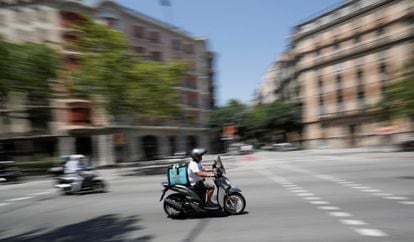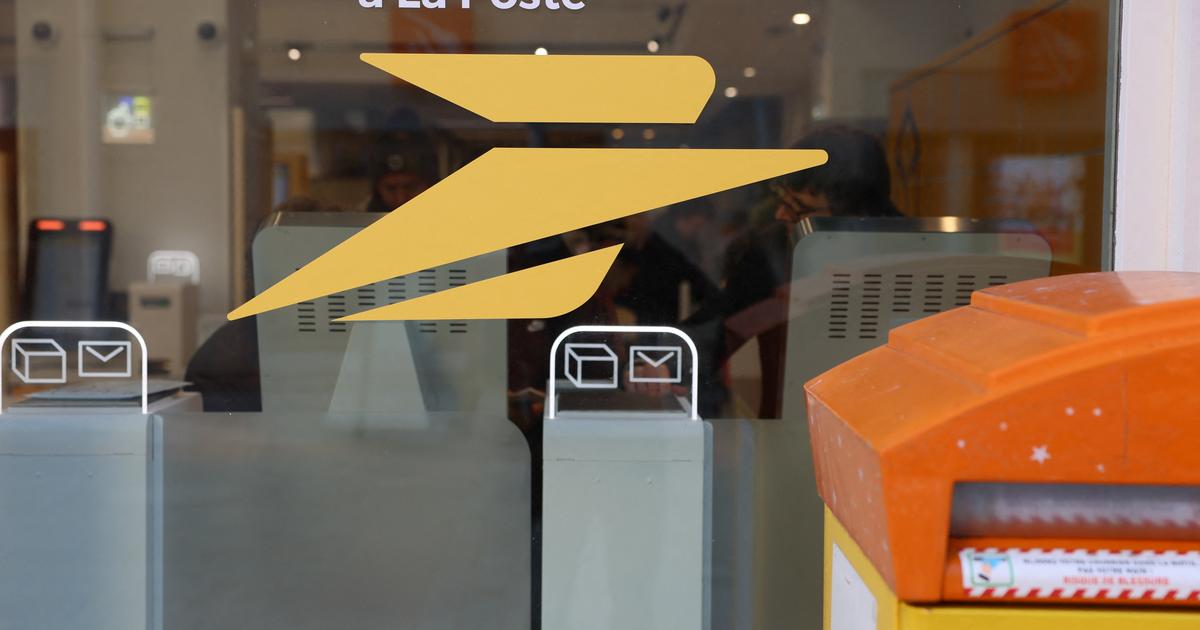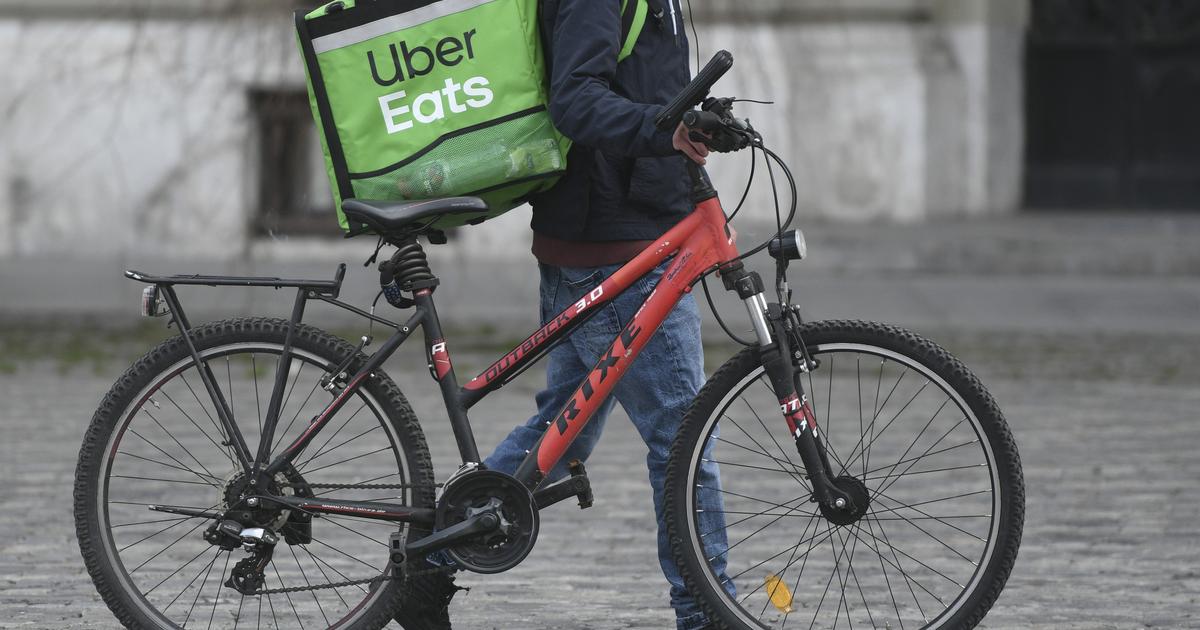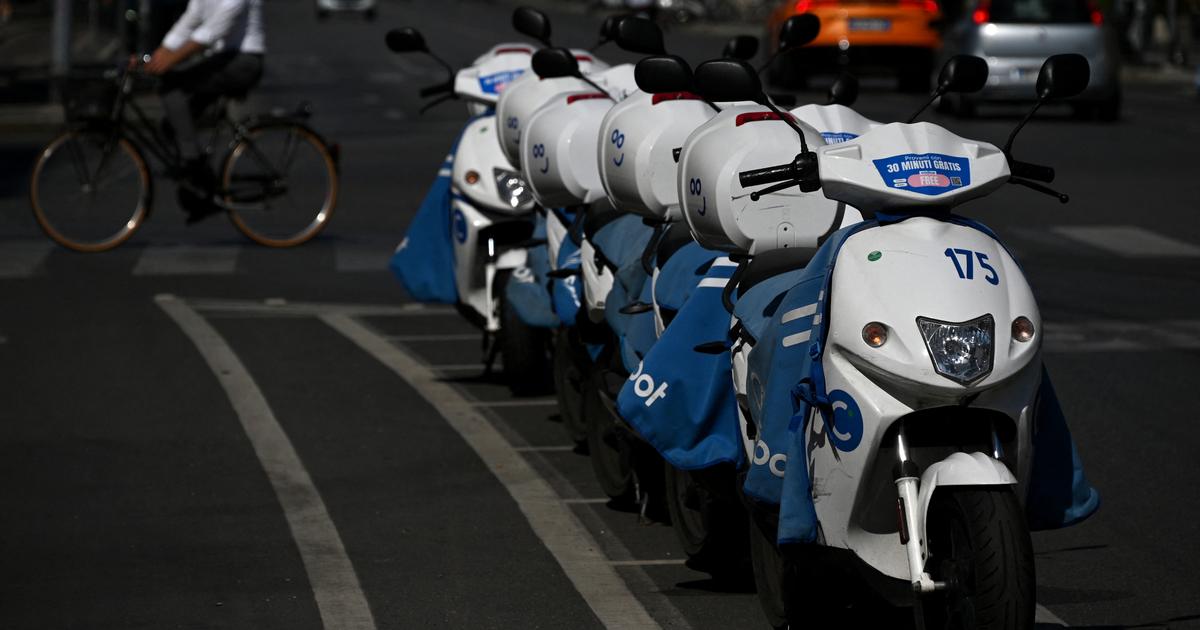A Deliveroo delivery person during a delivery of an order, in 2019 in Barcelona.Albert Gea
Deliveroo takes a step back. The home food delivery platform announced on Wednesday its intention to close its division in Spain based on the unfeasibility of the business. The process, as detailed by the company in a statement, will be subject to a consultation that the company will make in September to its employees, which will include the distributors. The announcement takes place two weeks before the so-called
rider law
that obliges delivery companies to hire their delivery companies
comes into force
, although company sources reiterate that this closure would not be linked to the new regulations.
The firm specifies that, in the rest of the 12 countries in which it operates, Deliveroo is the first or second operator in the market by volume, and that for this to happen in Spain they would need to make an investment that the company cannot assume.
In other words, the difficulty lies in its inability to compete with Uber Eats, Just Eat and Glovo.
The latter has already confirmed that it will hire around 2,000 delivery men in Spain to continue operating.
More information
The Supreme Court settles the debate on delivery drivers: declares 532 Deliveroo 'riders' employees
The 'riders' law is here: what changes does the new rule bring for dealers?
Thus, the movement coincides with the final stretch of the deadline given by the justice so that it incorporates to its staff the distributors who work as freelancers for the firm, which will occur on August 12. Deliveroo has 100 employees in Spain and collaborates with 2,500
riders
at this time who perform their function as freelancers, and has already confirmed that from that date they will be hired, as dictated by law, although it does not detail if it will hire the entire staff current.
Deliveroo is currently present in 12 markets and its profitability and the majority of the gross value of the transactions comes from the countries where it occupies the top positions in the market. Something that does not happen in Spain, where it is in 70 cities, which represents only 2% of the gross value of its operations. "Reaching and maintaining a top-level market position in Spain would require a very high level of investment with a very uncertain long-term potential return that could affect the economic viability of the market for the company," the platform says in the note.
“The decision to propose the cessation of our operations in Spain has not been taken lightly. We want to thank all the restaurants that have worked with Deliveroo in Spain, as well as our valued customers. We express special thanks to the thousands of
exceptional and always willing
riders
who have chosen to work with Deliveroo, as well as our talented and fully committed employees. Everyone will be supported during the consultation period, ”said Hadi Moussa, Deliveroo's director of international business.
Despite this, the cessation of operations is awaiting the result of the consultative process in Spain with its affected employees and distributors, although it seems that the management is clear that the best thing is to throw in the towel in the country and that this consultation is only about of a mere formalism.
The consultation will take place in early September and will last about a month, according to the firm.
In the event that it is decided to terminate operations in Spain, "the company will ensure that
riders
and employees have an adequate compensation package that complies with all regulations and local legislation," he added in the statement.
Judicial blows
Deliveroo arrived in Spain more than five years ago and has been one of the major players in the last-mile food delivery sector, both due to its high market share and due to its clashes with the law for the use of false self-employed workers in its fleets. . The last great blow was received from the Supreme Court at the end of May, when it declared 532
riders
of the company
employees
, the last great sentence that ended the debate on the legality of the system of use of autonomous distributors.
The statement does not refer to this factor as one of the reasons for the intention to close its Spanish division. Despite this, it seems clear that this is not a coincidence, since the change with the
rider law
will mean an increase in costs for companies such as Deliveroo, which will have to contract directly with delivery people or subcontract third-party companies.
This debate has also punished Deliveroo in other markets, to the point where its debut on the London Stock Exchange in March was overshadowed by a report by the UK Bureau of Investigative Journalism that concluded that a third of the firm's delivery men in that country earned less than the minimum wage. This information scared away key investors days before the company's market launch and its premiere closed with a sharp 30% drop in the value of the shares compared to expectations.
The performance in recent years of Deliveroo in Spain is unknown, since the company has not presented its annual accounts in the Mercantile Registry since 2016. Whatever the piece of cake on the platform, it is clear that its competition will now fight to stay that business, which will allow them to improve their performance. More if possible now, in the midst of the pandemic, a time when the use of this type of food delivery services increased.
The unions have already reacted to the announcement, and Comisiones Obreras, which already acted as an advisor to the workers in the ERE that was in Deliveroo in 2020, assures that it will work to defend the rights of the platform's employees. "We will work side by side with the affected people in the face of the mandatory consultation period before a collective dismissal process (ERE)," the organization said in a statement. To which he adds: “CC OO claims that the impact in labor terms on the 4,000 people who provide service, the vast majority as
riders
under the figure of false self-employed, be faced with full guarantees, recognizing their employment status as they have indicated. multiple acts of Labor Inspection and sentences of the Spanish courts ”.
For its part, the Professional Association of Autonomous Riders and distribuidoresunidos.org denounces that this is the first sign that the new
rider law will
precarious and destroy employment. "Today we have known one of the worst scenarios that we feared to face: the flight of companies," they say in a statement issued after knowing the Deliveroo announcement. In addition, they maintain in the note that offers of precarious contracts are being made, through temporary work companies. "The self-employed model is the most flexible both for the sector and for the distributors, and possibly the only one that allows guaranteeing with some stability the future of both in Spain", both platforms of distributors settle.















